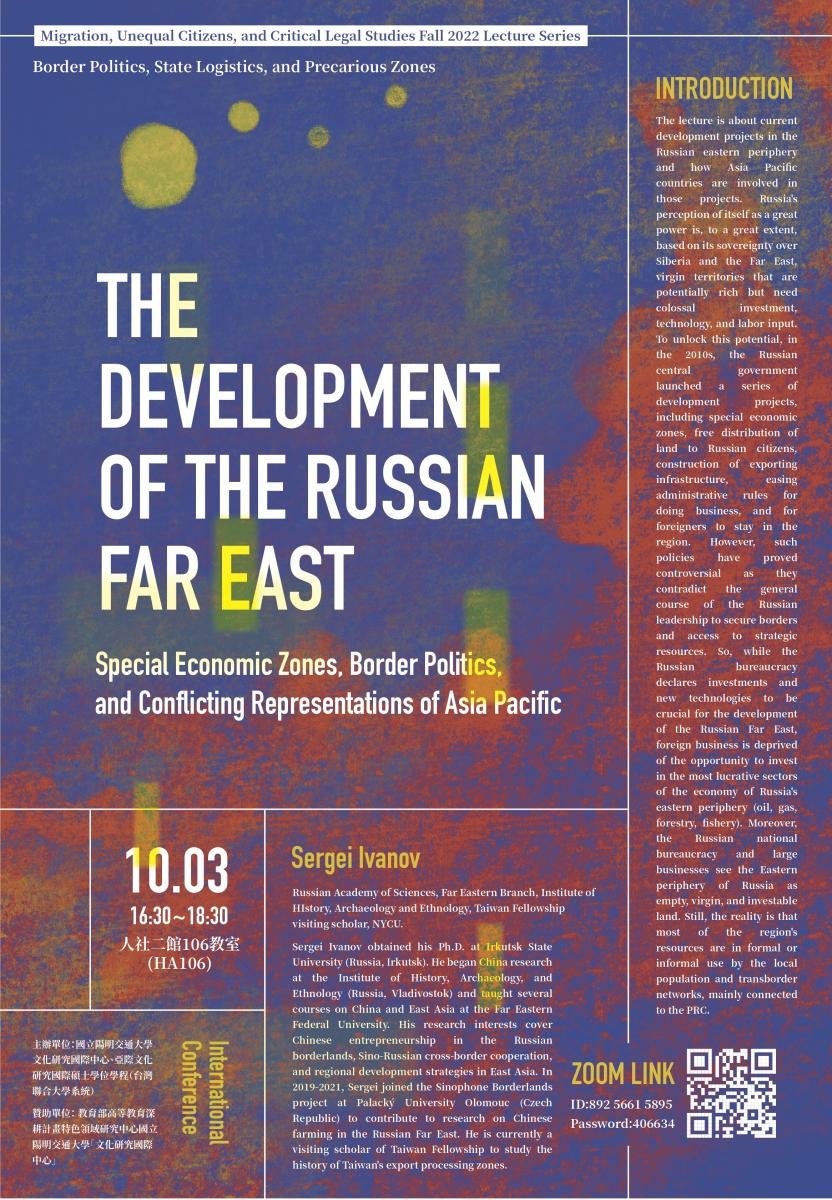


2022-08-01 - 2022-10-05
Fall 2022 Lecture Series: Border Politics, State Logistics, and Precarious Zones
The Development of the Russian Far East: Special Economic Zones, Border Politics, and Conflicting Representations of Asia Pacific
日期Date:111.10.03
時間Time:16:30~18:30
地點Venue: 人社二館106教室(HA106)
線上ZOOM LINK
https://us02web.zoom.us/j/89256615895?pwd=czJyNXRVT2gzUDhObm5kN1F1YUtIUT09
會議 ID:892 5661 5895
密碼Password:406634
*英文演講International Conference
Language: Lecture in English (Mandarin Interpretation provided)
語言:英文,提供中文同步翻譯
Speaker: Sergei Ivanov, Russian Academy of Sciences, Far Eastern Branch, Institute of HIstory, Archaeology and Ethnology, Taiwan Fellowship visiting scholar, NYCU.
講者自介Bio:
Sergei Ivanov obtained his Ph.D. at Irkutsk State University (Russia, Irkutsk). He began China research at the Institute of History, Archaeology, and Ethnology (Russia, Vladivostok) and taught several courses on China and East Asia at the Far Eastern Federal University. His research interests cover Chinese entrepreneurship in the Russian borderlands, Sino-Russian cross-border cooperation, and regional development strategies in East Asia. In 2019-2021, Sergei joined the Sinophone Borderlands project at Palacký University Olomouc (Czech Republic) to contribute to research on Chinese farming in the Russian Far East. He is currently a visiting scholar of Taiwan Fellowship to study the history of Taiwan's export processing zones.
活動簡介 Short introduction of the lecture:
The lecture is about current development projects in the Russian eastern periphery and how Asia Pacific countries are involved in those projects. Russia's perception of itself as a great power is, to a great extent, based on its sovereignty over Siberia and the Far East, virgin territories that are potentially rich but need colossal investment, technology, and labor input. To unlock this potential, in the 2010s, the Russian central government launched a series of development projects, including special economic zones, free distribution of land to Russian citizens, construction of exporting infrastructure, easing administrative rules for doing business, and for foreigners to stay in the region. However, such policies have proved controversial as they contradict the general course of the Russian leadership to secure borders and access to strategic resources. So, while the Russian bureaucracy declares investments and new technologies to be crucial for the development of the Russian Far East, foreign business is deprived of the opportunity to invest in the most lucrative sectors of the economy of Russia's eastern periphery (oil, gas, forestry, fishery). Moreover, the Russian national bureaucracy and large businesses see the Eastern periphery of Russia as empty, virgin, and investable land. Still, the reality is that most of the region's resources are in formal or informal use by the local population and transborder networks, mainly connected to the PRC.
主辦單位:國立陽明交通大學文化研究國際中心、亞際文化研究國際碩士學位學程(台灣聯合大學系統)
贊助單位: 教育部高等教育深耕計畫特色領域研究中心國立陽明交通大學「文化研究國際中心」
近期活動 Recent Activities